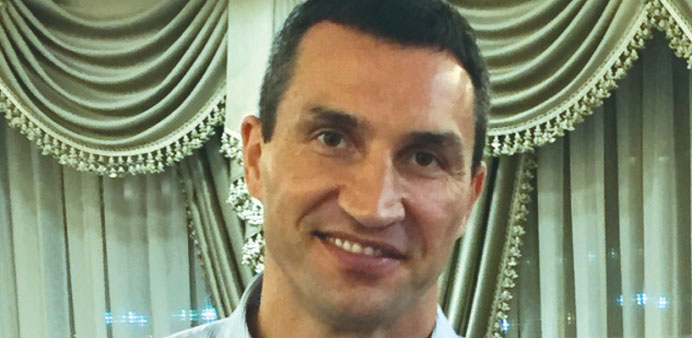He’s not just one of the greatest heavyweight boxers in the history of the sport, Wladimir Klitschko is also one of the most refined and reasoned speakers outside the ring. His philosophical responses and strategic approach to boxing have earned him the nickname ‘Dr Steelhammer’, and the reigning world champion of four sanctioning bodies is now readying for a record-breaking title defence in Germany against English boxer Tyson Fury on November 28.
During the just-concluded AIBA World Boxing Championships in Qatar, www.sc.qa had the chance to talk to the Ukrainian boxing legend about Qatar’s credentials as a sports nation, his passion for football, meeting with Bayern Munich coach Pep Guardiola, and his emotions after his adopted home country of Germany won the 2014 FIFA World Cup in Brazil. Excerpts:
Wladimir, you witnessed the Boxing Worlds in Qatar, in the same arena which also hosted the Handball World Cup earlier this year. Do you think Qatar has become as a global capital of sports?
I repeat the words of the great Nelson Mandela: “Sport has the possibility to change the world.” You see that it is not always the easy way. If you look at the football World Cup in Russia and in Qatar, there are occasions where the sport has been politicised. I believe through sport you can win more tolerance, and more mutual understanding between cultures. Here they see it as a positive signal because you have international media, the international presence of sports fans and tourists, and that makes people more open. That’s why I am supportive of such events, and that is why I am here with my brother. It is great to see that people in the Arab world are so passionate about boxing.
Your views on the first ever FIFA World Cup coming to Qatar in 2022?
I think you always come across a huge amount of criticism if you want to do anything extraordinary in an extraordinary place. I think we must support it and look at it in a positive way, and then we will judge afterwards how good or bad it was. But in general I think it is a great initiative, and an opportunity to inspire the sports fans of the Arab world and to show the world how life is here, and to show that there are no barriers. Sport allows cultures to mix and compare each other, improve, and allows the world to become more tolerant.
You’ve already seen the organisation of the boxing event. What are your impressions of the organisational know-how in the country?
You absolutely see an experienced hand in the organisation. It is evident that it is not done for the first time.
Your next boxing fight in late November will be held in a football arena in Dusseldorf. Are you a football fan too?
I am also a football fan, not a crazy one who sits in front of the television and watches every game. For the Euros and World Cups I am there, and in the Champions League when it comes closer to the final you suddenly become very aware of what’s going on.
Which football teams do you support?
It was always Dynamo Kiev and Bayern Munich, since forever I have had them close to my heart because I also know the players and for decades they either come to my fights or I go to their games.
You are known as a philosopher in the boxing world, and Bayern Munich coach Pep Guardiola is called a philosopher in the coaching world…
I actually just recently flew with him from Munich to Berlin. He is learning German, he is trying to integrate himself, which I find great. I was happy to get to know him more personally during the flight. It is great to see a Spaniard doing so well with a German team.
Ever imagined one of your future bouts being held in Qatar?
Everything is possible. Amateur boxing is here, so why not?

Wladimir Klitschko
